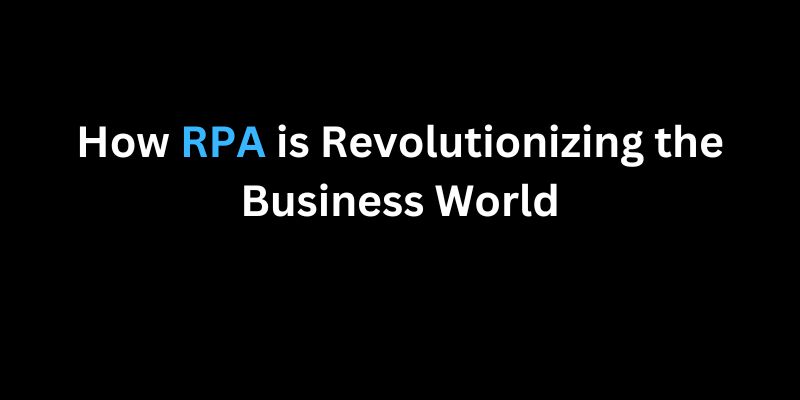
Introduction:
RPA is one of the most innovative and disruptive technologies that has emerged in recent years. By automating routine processes, it is transforming how firms run by allowing staff to concentrate on more crucial work. The technology has been gaining widespread adoption across different industries, and its benefits are becoming more apparent with each passing day.
The greatest RPA training in Chennai can be found at FITA Academy. With an RPA Course in Chennai, achieve RPA certification. We offer you complete assistance with placement.
What is RPA?
Robotic Process Automation (RPA) is a type of software that automates repetitive and rule-based tasks. RPA software can mimic the actions of a human worker, allowing it to perform tasks that would otherwise require human intervention. These tasks can range from data entry to complex calculations and can be performed across a range of applications and systems.
How does RPA work?
RPA works by using software robots or bots that can be programmed to perform a wide range of tasks. The bots can be trained to recognise patterns and perform tasks that follow a set of rules. They can also be programmed to interact with different applications and systems, making it possible to automate a wide range of tasks.
Industries where RPA is being used:
RPA is being used across a wide range of industries, including:
Join RPA Training Online for sessions that are hands-on. The best assistance is provided by FITA Institute for learning RPA programming.
Banking and Finance
RPA is being used to automate a range of tasks in the banking and finance industry, including data entry, customer service, and fraud detection.
Healthcare
RPA is being used in healthcare to automate tasks such as patient registration, appointment scheduling, and billing.
Retail
RPA is being used in retail to automate tasks such as inventory management, order processing, and customer service.
Manufacturing
RPA is being used in manufacturing to automate tasks such as quality control, supply chain management, and inventory management.
The future of RPA:
The future of RPA looks bright, with the technology expected to continue to gain widespread adoption across different industries. It is conceivable that as technology advances, we will see advanced RPA systems that can do increasingly difficult tasks.
Challenges of Implementing RPA:
Implementing RPA can be challenging, with some of the main challenges including:
Resistance to change
Implementing RPA requires a change in the way work is done, which can be met with resistance from employees who are accustomed to doing things a certain way.
Integration with existing systems
RPA needs to be integrated with existing systems and applications, which can be a complex and time-consuming process.
Maintenance and support
RPA systems require ongoing maintenance and support, which can be a challenge for businesses that do not have the necessary expertise in-house.
Conclusion:
RPA is revolutionizing the way businesses operate by automating repetitive tasks and freeing up employees to focus on more important tasks. The benefits of RPA are becoming more apparent with each passing day, and its adoption is likely to grow across different industries.
Interested in learning about robotic process automation? Get hands-on training from professionals by enrolling in RPA training in Coimbatore. The RPA training in Coimbatore will provide you with thorough insights into both fundamental and advanced principles.
Read more: RPA Developer Salary For Freshers.
